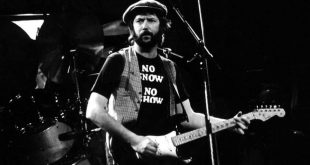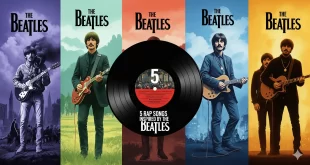Elvis Presley and The Beatles are undoubtedly two of the most iconic figures in the history of popular music. Both made significant contributions to the evolution of rock and roll and influenced countless musicians that followed. However, despite their immense popularity and cultural impact, there was a notable absence of mutual admiration between the two. In this blog post, we will explore the reasons behind Elvis Presley’s indifference towards The Beatles and shed light on the dynamics that shaped their relationship.

The Clash of Generations
Elvis Presley rose to fame in the 1950s, embodying the rebellious spirit of rock and roll. His charismatic stage presence and sensual performances made him an instant sensation. By the time The Beatles emerged on the scene in the 1960s, Elvis had already established himself as the King of Rock and Roll. The Beatles, on the other hand, represented a new wave of music that resonated with the younger generation.
The generational gap between Elvis and The Beatles played a significant role in their differing attitudes towards each other. Elvis, being a product of the conservative 1950s, viewed The Beatles’ long hair, unconventional fashion, and experimental music as a threat to the status quo. The Beatles, meanwhile, embraced the counterculture movement of the 1960s and saw Elvis as a symbol of the old guard.
Musical Differences
Another factor that contributed to the divide between Elvis and The Beatles was their contrasting musical styles. Elvis was known for his rockabilly sound, blending elements of country, rhythm and blues, and gospel. The Beatles, on the other hand, incorporated a wide range of genres into their music, including rock, pop, folk, and psychedelia.
Elvis, being a traditionalist when it came to music, had reservations about The Beatles’ experimental approach. He reportedly felt that their music lacked depth and was too focused on catchy melodies and harmonies. The Beatles, on the other hand, admired Elvis for his raw energy and pioneering role in popularizing rock and roll but saw his music as less innovative compared to their own.
Professional Jealousy
Professional jealousy is another aspect that cannot be overlooked when examining the relationship between Elvis and The Beatles. Both acts were incredibly successful and had massive fan bases, but they represented different eras of popular music. Elvis had dominated the charts in the 1950s and early 1960s, while The Beatles were the new darlings of the music industry.
Elvis, who had enjoyed unparalleled success and adoration, may have felt threatened by the rising popularity of The Beatles. He was no longer the center of attention and faced tough competition from a new generation of musicians. This jealousy could have contributed to his dismissive attitude towards The Beatles and his unwillingness to acknowledge their talent.
Lack of Personal Connection
Despite their different backgrounds and musical styles, Elvis and The Beatles never had a chance to build a personal connection. The Beatles idolized Elvis and hoped to meet him when they visited the United States in 1964. However, their attempt to arrange a meeting failed, and they never had the opportunity to interact with their musical hero.
The lack of personal connection between Elvis and The Beatles may have perpetuated the divide between them. Had they been able to meet and establish a rapport, it is possible that their opinions of each other could have been different. However, due to circumstances beyond their control, their paths never crossed in a meaningful way.
Conclusion
In summary, the reasons behind Elvis Presley’s indifference towards The Beatles can be attributed to a combination of factors. The clash of generations, contrasting musical styles, professional jealousy, and lack of personal connection all played a role in shaping their relationship. While it is unfortunate that these two legendary acts did not see eye to eye, their individual contributions to the world of music are undeniable. As fans, we can appreciate the impact they both had and recognize that sometimes, even musical legends may not see eye to eye.
Remember, Elvis and The Beatles are just one example of the complex dynamics that can exist between musicians. It’s important to celebrate the diversity of musical tastes and appreciate the contributions of all artists, regardless of personal preferences.
What Songs Sound Similar to The Beatles?





